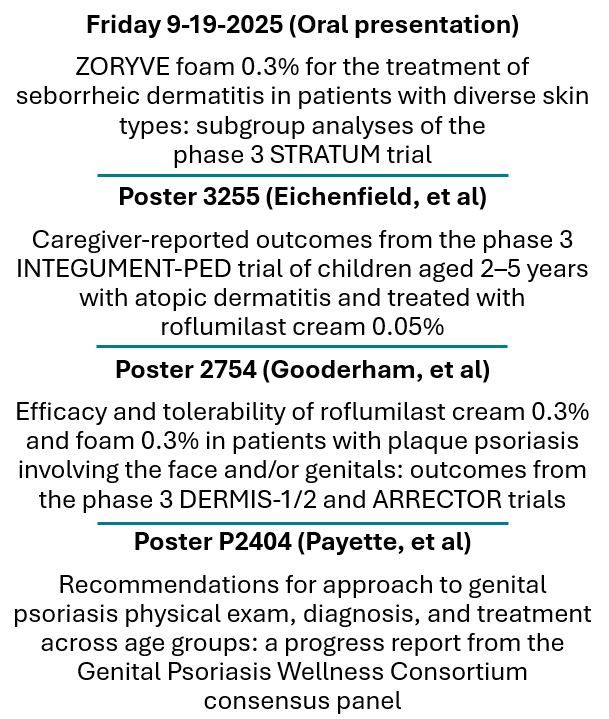- Clinical Technology
- Adult Immunization
- Hepatology
- Pediatric Immunization
- Screening
- Psychiatry
- Allergy
- Women's Health
- Cardiology
- Pediatrics
- Dermatology
- Endocrinology
- Pain Management
- Gastroenterology
- Infectious Disease
- Obesity Medicine
- Rheumatology
- Nephrology
- Neurology
- Pulmonology
Roflumilast Data Showcased Across Diverse Skin Conditions and Age Groups at EADV 2025
EADV 2025: Data will highlight the PDE4 inhibitor's efficacy across diverse populations and 3 common skin conditions: seborrheic dermatitis, atopic dermatitis, and psoriasis.
©molekuul.be/stock.adobe.com

Arcutis Biotherapeutics will present new analyses of efficacy data for roflumilast (Zoryve) at the 34th Annual European Academy of Dermatology and Venereology Congress in Paris this week, demonstrating the topical phosphodiesterase-4 inhibitor's (PDE4) performance across diverse populations and 3 inflammatory skin conditions —seborrheic dermatitis, atopic dermatitis, and psoriasis.
Seborrheic Dermatitis - Phase 3 STRATUM Trial
Findings from subgroup analyses of the phase 3 STRATUM trial showed roflumilast foam 0.3% achieved significant improvement in seborrheic dermatitis across racial and ethnic groups. In the study's overall population, the treatment reached 79.5% Investigator Global Assessment (IGA) Success at week 8 versus 58.0% with vehicle in the overall population, with consistent responses across racial subgroups: White patients (80.3% vs 57.2%), Black/African American patients (71.5% vs 59.4%), and other races (82.0% vs 62.5%).
Ethnicity-based analyses showed similar patterns, while analyses stratified by Fitzpatrick skin type demonstrated effectiveness across the spectrum, with types I–III achieving 80.7% success versus 55.1% with vehicle, and types IV–VI reaching 76.3% versus 66.4% with vehicle.
"It is critical to understand how a treatment will perform across diverse skin types to ensure it is safe and effective and does not further exacerbate signs or symptoms that are commonly associated with seborrheic dermatitis," Raj Chovatiya, MD, PhD, MSCI, associate professor at the Rosalind Franklin University Chicago Medical School and presenter of the seborrheic dermatitis data, said in an Arcutis statement.
Pediatric Atopic Dermatitis - INTEGUMENT-PED Phase 3 Trial
Separate pediatric data from the INTEGUMENT-PED Phase 3 trial examined caregiver-reported outcomes in children aged 2–5 years with atopic dermatitis treated with investigational roflumilast cream 0.05%. The once-daily treatment produced greater improvements versus vehicle across multiple patient-reported outcome (PRO) measures assessing signs, symptoms, and severity after 4 weeks of treatment. PRO scores also indicated improved quality of life and a decrease in the negative impact of the condition on the family.
Children treated with roflumilast cream 0.05% also showed improvements in SCORing Atopic Dermatitis (SCORAD) total and component scores, including itch, sleep loss, and dryness intensity measures. Disease severity and impact assessments using the Patient-Oriented Eczema Measure (POEM) also favored the active treatment. Overall tolerability of roflumilast cream 0.05% was good with no or minimal reports of irritation at the application site, including after the first application. Outcomes were consistent with those reported for children aged ≥6 years with atopic dermatitis who participated in the 4-week INTEGUMENT-1 and -2 trials, according to Arcutis.

Plaque Psoriasis - DERMIS-1/2, ARRECTOR Phase 3 Trials
Data from the Phase 3 DERMIS-1/2 and ARRECTOR trials showed both roflumilast cream 0.3% and foam 0.3% formulations improved signs and symptoms of plaque psoriasis in patients with facial and/or genital involvement at 8 weeks of treatment, with good tolerability reported for each. The subgroup improvements matched those seen in the overall study populations and remained consistent between cream and foam formulations.
Consensus Recommendations
As a follow-up to earlier work on treatment for genital psoriasis, the Genital Psoriasis Wellness Consortium will present a poster outlining recommended approaches for exams, diagnosis, and treatment across age groups, ranging from pediatric and adolescent to adult and geriatric.
"The data being presented at EADV 2025 underscore the versatility, tolerability, and impact of roflumilast across multiple chronic, immune-mediated skin conditions and diverse age groups and skin types," Patrick Burnett, MD, PhD, FAAD, Arcutis chief medical officer, said in the statement. "We remain committed to advancing innovative therapies that meaningfully improve the lives of people living with inflammatory skin diseases, and we are proud to share these important results with the dermatology community at this year's EADV Congress."
Roflumilast is a next-generation, highly potent, and selective topical PDE4 inhibitor that targets an intracellular enzyme involved in increasing pro-inflammatory mediator production and simultaneously decreasing anti-inflammatory mediators. The FDA has approved multiple formulations: cream 0.3% for plaque psoriasis including intertriginous areas in patients ≥6 years, cream 0.15% for mild to moderate atopic dermatitis in patients ≥6 years, and foam 0.3% for plaque psoriasis of scalp and body in patients ≥12 years and seborrheic dermatitis in patients ≥9 years.
References
- Arcutis to present multiple new ZORYVE (roflumilast) data analyses at European Academy of Dermatology and Venereology Congress. News release. Arcutis Biotherapeutics. September 17, 2025. Accessed September 17, 2025. https://investors.arcutis.com/node/13721/pdf
